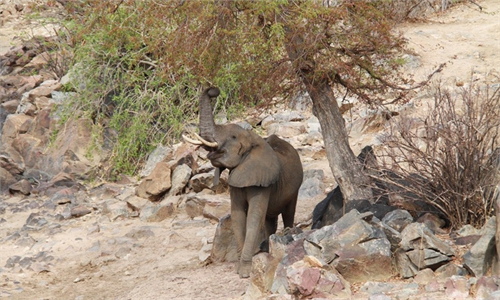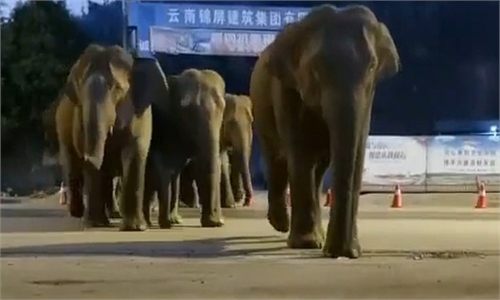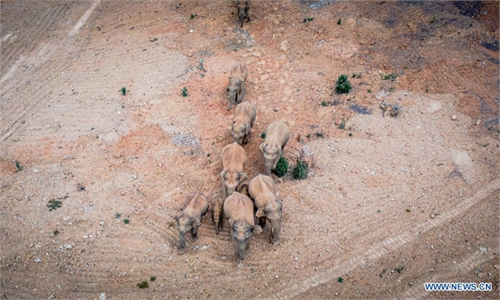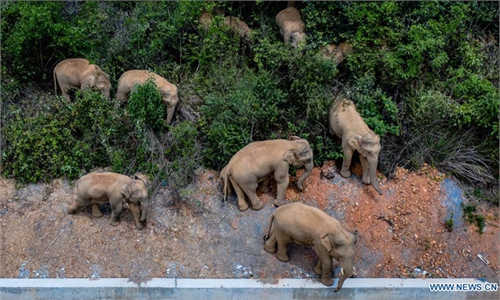
Photo: Screenshot of a video posted by The Beijing News
In the past few days, news of the exodus of a herd of wild elephants from Southwest China's Yunnan Province continued to hit headlines. But netizens were even more stunned by the latest headlines Wednesday morning - internet celebrities were scrambling for the pineapples left over by the elephants.
When one web host hoping to live broadcast the bizarre event arrived in Yuxi, Yunnan on Tuesday night, he was surprised to find many others thinking the same thing. Several webcasters, including many with tens of thousands of followers, came to the small town hoping to livestream the process of tracking the elephant herd.
Starting from their original habitat, Xishuangbanna National Nature Reserve, in Yunnan's southernmost prefecture on April 16, a herd of 15 elephants had wandered over 400km north. It was the furthest a herd of wild elephants in Xishuangbanna had ever travelled away from their habitat. Local authorities have vowed to make every effort to persuade the animals to return home.
On Tuesday, the local emergency rescue team placed corn, pineapples and other food on the route the herd of wild elephants was taking, successfully luring them into the deep forest and away from the city where they were previously headed.
During the manoeuvre, the elephants did not eat all the pineapples used to bait them. Video shows web celebrities picking up these pineapples and eating them, then asking their fans to give them thumbs-up.
Local emergency personnel have advised the webcasters to leave the scene, comply with local regulations and not to enter the area where the elephant herd is being driven in order to avoid any potential danger.
Most netizens expressed dismay and disgust at the live broadcasts, and some pointed out that they were concerned that such behavior could lead to the spread of diseases such as rabies.
Experts dismissed fears that eating with wild elephants would spread rabies, but also noted that the act still carries the risk of spreading other diseases.
"There is a possibility, albeit a small one, of transmitting the virus by sharing food with wild elephants," Yang Zhanqiu, deputy director of the pathogen biology department at Wuhan University, told the Global Times on Wednesday.
This is the intentional use of vulgar behavior to attract traffic, Zhu Wei, a professor at the China University of Political Science and Law, told the Global Times on Wednesday.
"If such livestreams get a lot of attention and make it to the top list, it may make more people imitate such behavior," Zhu said.
Zhu also pointed out that the authorities are currently closing roads in the area to better guide the elephant herd. If more people come to imitate this behavior, it will affect the local order and make the elephant drive more difficult to carry out, and may even cause danger.
"Such behavior clearly violates China's regulation on livestreaming," Zhu said.
Zhu believed these videos will soon be taken down from livestreaming platforms, as the platforms are responsible for reviewing their content.
As of Wednesday afternoon, no livestreaming videos featuring webcasters eating elephants' leftovers were on the top lists of top livestreaming platforms Douyin and Kuaishou.




